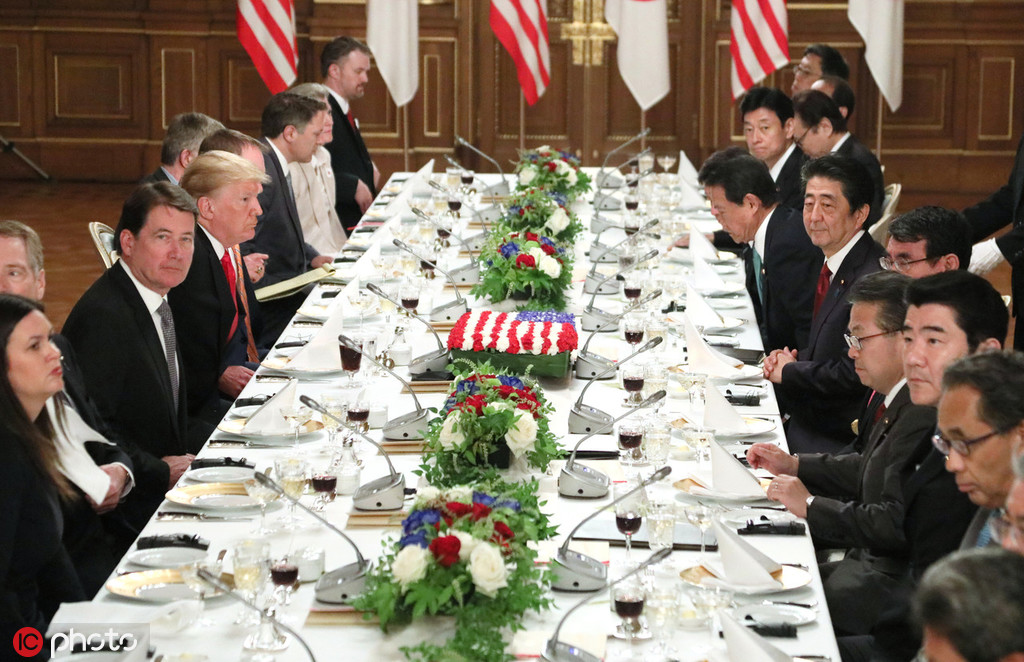US aims to cut trade deficit with Japan
By Cai Hong | China Daily Global | Updated: 2019-06-04 10:16

Trump seeks to gain more access for exports by its farmers, automakers
US beef was on the lunch menu for US President Donald Trump and his host Japanese Prime Minister Shinzo Abe after they played golf in Tokyo on May 26, according to Japan's foreign ministry.
That meal was clear enough to show Trump's stance on his country's trade or, to be more exact, deficit with Japan.
Japan is the US' fourth largest goods trading partner, with their two-way trade touching $217.6 billion in 2018, according to the office of US Trade Representative. The US goods trade deficit with Japan was$67.6 billion in 2018. The US had a services trade surplus of $10.9 billion with Japan last year.
Trump abhors trade deficits, and is determined to reduce the one the US has with Japan, particularly by gaining more access for exports by US farmers and automakers, Fortune, a business magazine, said.
Trump pulled the US out of the Trans-Pacific Partnership shortly after he occupied the White House in 2016.
But the remaining 11 nations, including Japan, went ahead with the negotiations on a trade deal and signed the Comprehensive and Progressive Agreement for Trans-Pacific Partnership. The deal entered into force on Dec 30. Japan also struck another free trade deal with the Europe Union in 2018.
Analysts believe the two deals have left US farmers at risk of losing market share in Japan to rivals with lower tariffs.
"US pork producers are losing market share in Japan to international competitors that have recently negotiated more favorable trade terms in our most valuable market," US National Pork Producers Council said in an April 1 statement.
In March, US Trade Representative Robert Lighthizer told US lawmakers that winning greater market access for American agricultural products in Japan is a high priority.
Japan and the US started trade talks in April. Trump did Abe a favor during their meeting by offering to delay the start of full bilateral trade talks until after Japan's upper house election in July, with many predicting Abe will dissolve the more powerful lower house for a general election.
On May 24, Trump warned he would take additional action if negotiations with Japan do not bear fruit. On May 25, the day he arrived in Tokyo, he said: "Japan has had a substantial advantage for many, many years." He also called on Japanese businesses to invest more in the US.
After playing golf with Abe in Tokyo on May 26, Trump tweeted that "agriculture and beef heavily in play" in the talks.
"Trade-wise, I think we'll be announcing some things, probably in August, that will be very good for both countries," Trump said.
At their summit at the White House on April 26, Trump and Abe agreed to quickly wrap up a trade deal.
Xu Mei, researcher with the Institute of Japanese Studies of the Chinese Academy of Social Sciences, said Japan and the US are putting their domestic factors into consideration when arranging their negotiations.
The US wants to secure a quick deal, selling more agricultural produce to Japan so as to garner more support from US farmers. "It will be a plus for Trump for the 2020 presidential election," Xu said.
For Abe, the upper house election in July is a political challenge. Rural areas are the big source of support for Japan's ruling Liberal Democratic Party that Abe is now heading.
Trump and Abe are expected to determine the direction of the trade talks at their meeting on the sidelines of the G20 Summit in Osaka in June.
Japan is concerned a breakdown in negotiations would revitalize Washington's hardline stance.
On May 15, Trump decided to delay tariffs on auto imports from Japan and EU by up to 180 days.
To help its trade numbers with the US, Japan is boosting its defense spending so as to buy more US military equipment.
Japan started to lift the cap on defense spending from April 1.
Chen Hongbin, associate researcher with Shanghai Institutes for International Studies, said Japan's move to remove the cap on defense budget can boost the country's defense capabilities and deal with the pressure from the US.
"Trump has been pushing Japan to buy more US military equipment. Putting a stronger alliance into consideration, Abe is taking all that Trump offers," Chen said.
Japan's auto companies need to follow in the footsteps of Toyota by investing more and expanding production in the US, said He Ping, associate professor of the Center for Japanese Studies at Fudan University.
























